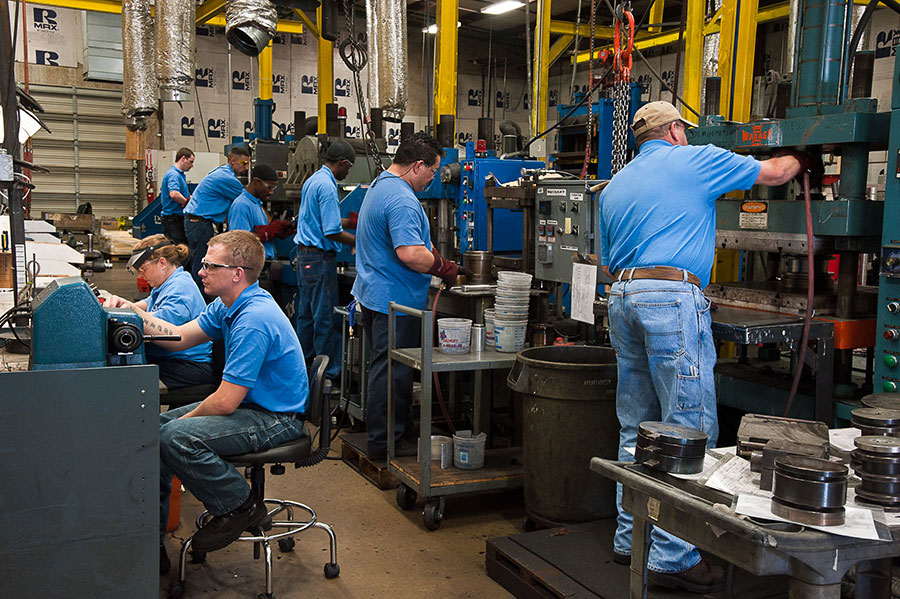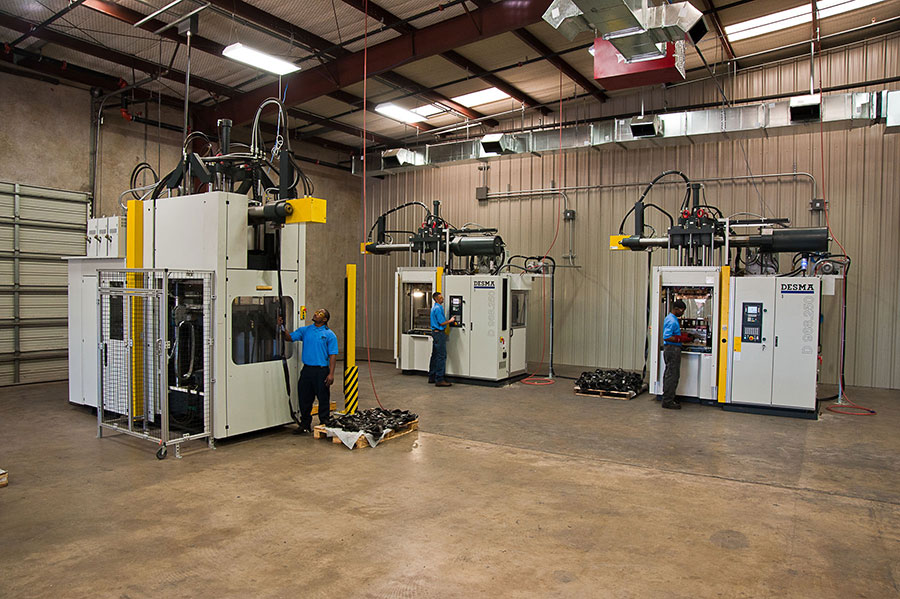General Plastics & Composites is a Leader in the Elastomers and Phenolic Industry
GP&C produces molded rubber products and turnkey assemblies.
General Plastics & Composites provides elastomers and phenolic molded products and turnkey assemblies for oilfield services worldwide. Customers benefit from our ability to develop turnkey assemblies and control quality, cost and lead time. We are a recognized leader in the rubber industry.
Services:
- Rubber compounding to meet temperature and pressure requirements
- Bonding to metal and composite materials
- Working with customers to provide solutions to customer-specific rubber applications
- Turnkey solution for parts requiring a combination of metal, rubber, and composites, with one customer purchase order.
- Assemblies include housings, isolation joints, antennas, standoffs, and composite tool assemblies.
- Specialized at making fit-for-purpose composites for the oil and gas industry that are easily drillable with PDC and conventional drill bits, MWD/LWD tools, wireline logging tools, when non-conductive, non-magnetic characteristics are desired.

Rubber manufacturing methods:
General Plastics & Composites has 21 presses including compression and transfer presses, DESMNA injection presses, and Rep Injection presses.
Compression Molding
Compression molding consists of placing a pre-measured rubber charge directly into the mold cavity and compressing under a stated temperature for a calculated amount of time. Currently used in the manufacture of components that requires different materials to be layered on top of each other.
Transfer Molding
Transfer molding occurs when a rubber charge is measured out to encompass the entire cavity volume, then placed into the transfer pot where a piston will force the rubber through the sprue and into the cavity. Once this has taken, the rubber will sit at a stated temperature for a calculated amount of time, until the desired cure level is reached. This process is currently used in applications where a customer has a requirement for rubber to be injected around or into detailed areas.
Injection Molding
Injection molding is used for the production of high volume parts due to the fast manufacturing process. This process requires a pre-determined volume of rubber to be fed into the press, warmed to viscosity and shot into the mold where it will sit in temperature until the desired cure is met.
Phenolic Molding
Phenolic molding involves a fiber reinforced resin, either granular or strands of fiber, to mold a part that is designed for excellent heat resistance and dimensional stability. The molding process at GP Rubber consists of compression or transfer as listed above.

Press Capabilities
General Plastics & Composites has a total of 15 compression presses, compression and transfer presses, Rep Injection presses and DESMA Injection presses.Tonnage:
Platen Size:
Clearance:
Ranges from 50-565
Ranges from 18″ X 12″ – 32″ X 32″
Ranges from 11″- 35″
In-house rubber compound mixing
General Plastics & Composites makes 40+ different rubber compounds in-house in its facility in Haltom City, TX (DFW area). Watch a video about our facility. Batch sizes range from 40-120 lbs. and enable us to exactly meet your specifications in temperature, chemical and abrasion resistance. We also mix colored compounds, such as orange, red, green and brown, and any color needed for identification purposes. In-house compounding also allows us to take control of lead-time rather than relying on an outside compounder. Common compounds used include these that are well-proven in downhole environments:- Aflas
- Silicones
- Fluroelastomers
- Nitriles
- Carboxylated Nitriles
Rubber Compounding In-House at General Plastics & Composites
This video shows the process of making rubber.Rubber/Elastomers FAQ
Elastomer is a fancy word, and all it means is “rubber”. Some polymers which are elastomers include polyisoprene or natural rubber, polybutadiene, polyisobutylene, and polyurethanes. What makes elastomers special is that they can be stretched to many times their original length and can bounce back into their original shape without permanent deformation.
Our rubber compounds can be used in a variety of applications ranging up to 425 F. We work with our oilfield customers to understand the conditions the material will be asked to perform under to suggest the best material for the application.
The most common types of elastomers are Aflas, Silicones, Fluroelastomers, Nitriles, Carboxylated Nitriles, H.S.N./HNBR, Natural Rubber and S.B.R. (Styrene-Butadiene-Rubber). We do compound additional formulations dependent on customer’s needs.
Typically, a mold designed to the specific part dimensions is required to meet the customer’s tolerances and material requirements.
Material strength depends on the rubber compound and the parameters the elastomer is being used in. Please contact your Account Manager for more details.
Our engineers and technicians work jointly with customers to develop prototypes, choose the best elastomer materials and manufacturing methods for construction, and coordinate and conduct in-house testing, assuring an innovative solution for your oilfield-specific needs.
It is best to involve our engineers early in the design phase for their expert guidance in using the molded materials for mechanical applications. Vital recommendations on the front-end will prevent time-consuming and costly changes at the back-end.
For more information, contact us.
GP Rubber maintains strict confidentiality in all interactions with our customers or would-be customers. No analytical data, reports, opinions, discussions, and other information are released to any third party without your permission.
Confidentiality is a very important aspect of our work at General Plastics & Composites, and our excellent reputation in the industry is a result of not only our product knowledge expertise and service, but also for our high code of ethics.
Yes, confidentiality agreements will be signed upon request to our management.
